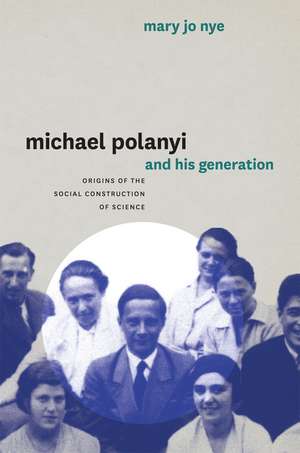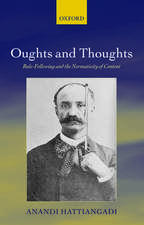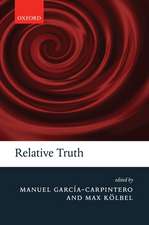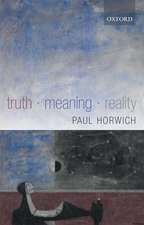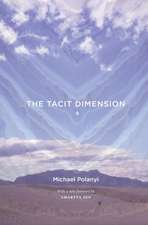Michael Polanyi and His Generation: Origins of the Social Construction of Science
Autor Mary Jo Nyeen Limba Engleză Paperback – 30 iul 2013
In Michael Polanyi and His Generation, Mary Jo Nye investigates the role that Michael Polanyi and several of his contemporaries played in the emergence of the social turn in the philosophy of science. This turn involved seeing science as a socially based enterprise that does not rely on empiricism and reason alone but on social communities, behavioral norms, and personal commitments. Nye argues that the roots of the social turn are to be found in the scientific culture and political events of Europe in the 1930s, when scientific intellectuals struggled to defend the universal status of scientific knowledge and to justify public support for science in an era of economic catastrophe, Stalinism and Fascism, and increased demands for applications of science to industry and social welfare.
At the center of this struggle was Polanyi, who Nye contends was one of the first advocates of this new conception of science. Nye reconstructs Polanyi’s scientific and political milieus in Budapest, Berlin, and Manchester from the 1910s to the 1950s and explains how he and other natural scientists and social scientists of his generation—including J. D. Bernal, Ludwik Fleck, Karl Mannheim, and Robert K. Merton—and the next, such as Thomas Kuhn, forged a politically charged philosophy of science, one that newly emphasized the social construction of science.
Preț: 273.80 lei
Nou
Puncte Express: 411
Preț estimativ în valută:
52.39€ • 54.85$ • 43.35£
52.39€ • 54.85$ • 43.35£
Carte tipărită la comandă
Livrare economică 05-19 aprilie
Preluare comenzi: 021 569.72.76
Specificații
ISBN-13: 9780226103174
ISBN-10: 022610317X
Pagini: 428
Ilustrații: 17 halftones, 2 line drawings
Dimensiuni: 152 x 229 x 28 mm
Greutate: 0.54 kg
Editura: University of Chicago Press
Colecția University of Chicago Press
ISBN-10: 022610317X
Pagini: 428
Ilustrații: 17 halftones, 2 line drawings
Dimensiuni: 152 x 229 x 28 mm
Greutate: 0.54 kg
Editura: University of Chicago Press
Colecția University of Chicago Press
Notă biografică
Mary Jo Nye is the Thomas Hart and Mary Jones Horning Professor of the Humanities Emerita and professor of history emerita at Oregon State University.
Cuprins
Acknowledgments
Introduction
Introduction
One / Scientific Culture in Europe and the Refugee Generation
Two / Germany and Weimar Berlin as the City of Science
Three / Origins of a Social Perspective: Doing Physical Chemistry in Weimar Berlin
Four / Chemical Dynamics and Social Dynamics in Berlin and Manchester
Five / Liberalism and the Economic Foundations of the “Republic of Science”
Six / Scientific Freedom and the Social Functions of Science
Seven / Political Foundations of the Philosophies of Science of Popper, Kuhn, and Polanyi
Eight / Personal Knowledge: Argument, Audiences, and Sociological Engagement
Two / Germany and Weimar Berlin as the City of Science
Three / Origins of a Social Perspective: Doing Physical Chemistry in Weimar Berlin
Four / Chemical Dynamics and Social Dynamics in Berlin and Manchester
Five / Liberalism and the Economic Foundations of the “Republic of Science”
Six / Scientific Freedom and the Social Functions of Science
Seven / Political Foundations of the Philosophies of Science of Popper, Kuhn, and Polanyi
Eight / Personal Knowledge: Argument, Audiences, and Sociological Engagement
Epilogue / SSK, Scientific Constructivism, and the Paradoxical Legacy of Polanyi and the 1930s Generation
List of Abbreviations
Notes
References
Index
Recenzii
“There isn’t a lot of current interest in who Polanyi was and how he came to hold the views he did. Mary Jo Nye’s excellent and richly researched book aims to tell us and, along the way, uncovers a genealogy for the notion of tacit knowledge that situates it in the force fields shaping much 20th-century thinking about politics and economics as well as science.”
“[Nye’s] rich, impressive book recasts the science wars barbs of the recent past by illuminating the searing politics, intellectual passions, and spirited debates that drove Polanyi and his generation to think about science in social terms.”
“Replete with encounters with major intellectual currents and figures of the mid-twentieth century and with a wealth of references, this book will be a touchstone for scholars seeking to understand how science and its claims to truth evolved in the twentieth century. Highly recommended.”
“The book shows the continuities between the phases of Polanyi’s manifold career—from Budapest, to Berlin, to Manchester, to Oxford; from medicine, to physical chemistry, to economics, to politics, to philosophy of science—and convincingly demonstrates how each phase furnished Polanyi with conceptual resources he deployed to tremendous effect in his magnum opus, Personal Knowledge: Towards a Post-Critical Philosophy. . . . Throughout this transnational story of a whole generation of scholars, Nye not only displays immense erudition but astutely analyzes how the ‘social construction of science’ came to be understood as a critique of science. Close attention to her arguments will reward patient readers from any academic background.”
“The scholarship behind Nye’s book is both wide and deep; its organization very thoughtfully plotted; and its presentation remarkably coherent, given the many-layered narrative. Due to the scope of the inquiry, readers like this reviewer may encounter individuals and ideas previously unknown to them from the fields of sociology, philosophy, economics, and politics, in addition to a number of lesser known scientists. . . . Nye’s nuanced and persuasive narrative will amply reward the reader who gives it the close attention it deserves.”
“No brief review can do justice to this densely packed book. Those interested in Polanyi’s insider account of the nature of scientific investigation can be grateful for Mary Jo Nye’s painstaking research.”
“[A] masterful study of how Polanyi’s concepts were molded by their context. In analyzing the complex interplay of theories, practice, and social life in Polanyi’s career, Nye exposes the experiences of her subject, encompassing the ‘hard’ sciences as well as economics, philosophy, religion, and much else. But there Nye does not stop. She systematically places Polanyi’s scholarship in the context of his major contemporaries. In doing so, she introduces, among many others, the basic outlines of Kuhn, Popper, Imre Lakatos, Mannheim, Robert K. Merton, and Friedrich von Hayek. All of these are succinctly explained, and put into the perspective of Polanyi’s interests. . . . [A] piece of scholarship that brilliantly achieves a deeper understanding of how a major classic of science studies came into being, and has been shaped by its receptions . . . [and] a crucial work on the social construction of science studies.”
“It is a rare and pleasant experience to review a book that is as good as the laudatory comments that appear on the back of the book jacket say it is. That is happily the case with Michael Polanyiand His Generation by Mary Jo Nye. . . . For anyone interested in the history and philosophy of science in the twentieth century there is literally something for everyone, and everything in the book is of value. . . . I strongly recommend that you read her book yourself. You will not be disappointed.”
“This long-awaited volume is a masterpiece of historical research, cultural and political exposition, and analytical insight. It is thus much more than a simple biography of the physical chemist and philosopher Michael Polanayi, as it provides a substantive analysis of the scientific und intellectual context of his life and work, merging history and philosophy of science with intellectual and social history.”
“Mary Jo Nye is the mistress of all she surveys: history, culture, economics, science, sociology, and philosophy. She has an eye for the telling detail that reveals how Polanyi’s mind developed in and through the turmoil of the twentieth century. I have read this book twice and look forward to reading it again to savor her understanding of what made Polanyi excel both in science and in his philosophy of science. Polanyi planted seeds that are still bearing fruit; Nye helps gather in the harvest. She frames Polanyi’s achievements in such a way as to make them more accessible and more fruitful for our generation and for those to come.”
“This is a sure-handed polymathic study of a distinguished polymath. Michael Polanyi and His Generation is an impressive intellectual achievement, a book that will be read with pleasure and profit by multiple audiences.”
“Professor Nye’s splendid book is an exemplary case study of major developments in twentieth century science, seen from an essentially cosmic viewpoint, with high science indebted to a whole spectrum of cultural factors, from philosophy to politics, from economics to world history.”
